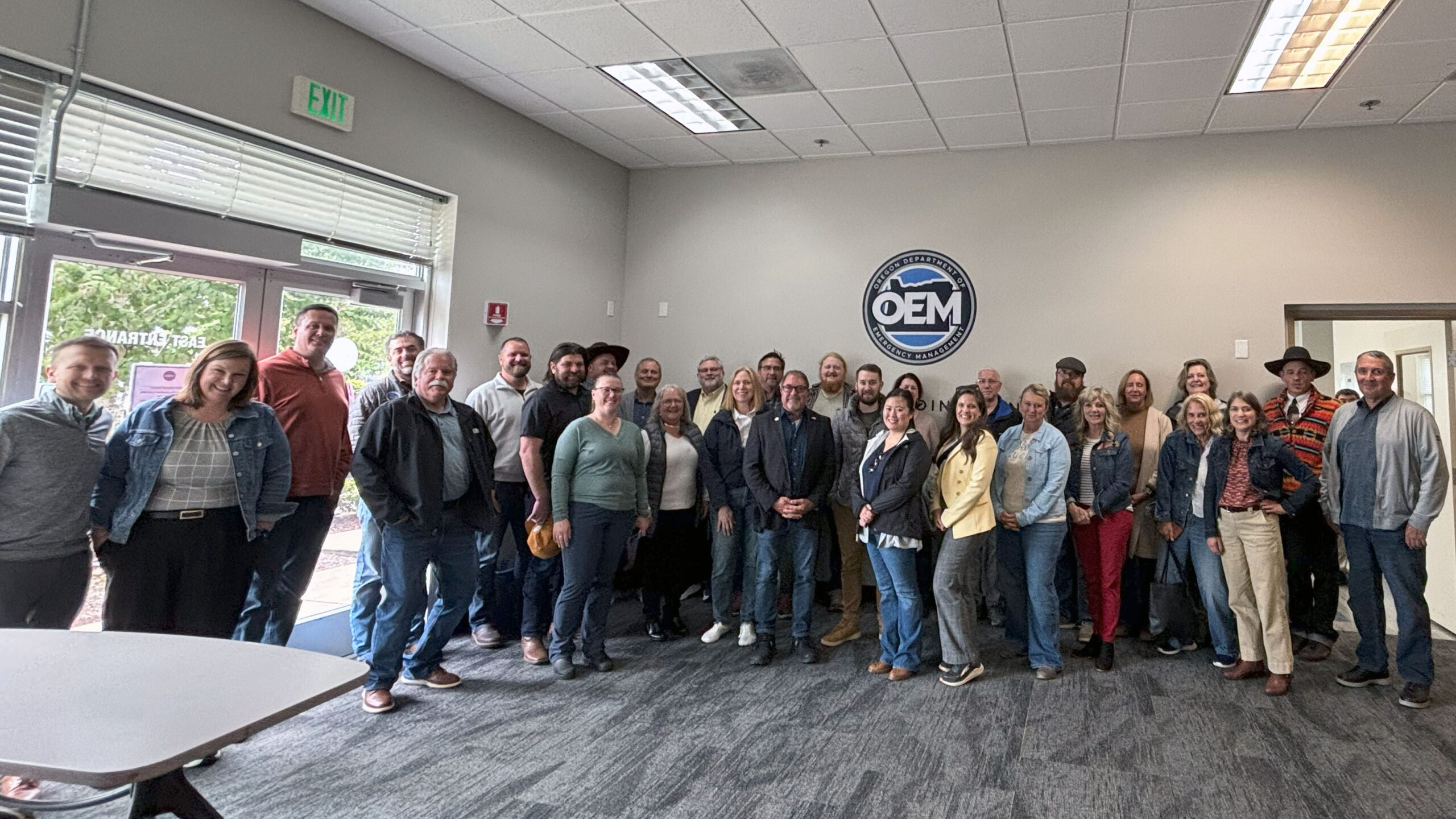
AOC Advocacy Update – Second Chamber Deadline
The “second chamber deadline” for the 2025 Legislative Session passed on Friday, May 23, at 5 p.m. Bills must have been voted out of the second chamber policy committee in order to continue moving through the legislative process toward becoming law. Nearly all of the Association of Oregon Counties’ (AOC) priority bills are advancing or are in committees not subject to this deadline. Most of the bills opposed by AOC have been amended to mitigate our concerns or will not move forward this session.
As the Legislature prepares its balanced biennial budget, policy bills with a fiscal component requiring state general fund allocations are sent to the Joint Committee on Ways and Means. If the budget writers intend to fund those policy bills, they will be referred to the appropriate subcommittee for further consideration before being heard in the full joint committee. Bills must pass both the House and Senate before the legislative assembly adjourns “sine die” – Latin for “without a day.” The presiding officers have identified Wednesday, June 18, as “target sine die,” and Sunday, June 29, is “constitutional sine die.”
Below are updates on AOC’s 2025 session priorities and bills on which we have been actively engaged. A comprehensive bill list is available on AOC’s Legislative Committee Website and is regularly updated throughout the session.
May Revenue Forecast
The latest revenue forecast was presented to the Legislature by state economists on Wednesday, May 14. As some expected, projected revenues available for the 2025-2027 biennium were revised downward from last quarter – due to a reduction in both revenue and resources – resulting in $755 million less than previously expected for the Legislature to allocate. However, the state’s kicker rebate has also been reduced to $1.6 billion providing a net General Fund balance of $35.7 billion. Paired with an additional $5.3 billion from lottery revenues, recreational marijuana excise tax, and Corporate Activity Tax, Oregon stands with just over $41 billion in total available funds, plus a 10.6% emergency reserve. Given Governor Kotek’s proposed 2025-2027 budget recommending $39.3 billion in funding, Oregon is in a reasonable position compared to our neighboring states to continue providing existing public services.
AOC 2025 Session Priorities Status Updates
Assessment and Taxation Funding
Ongoing conversations and negotiations with stakeholders and members of the House Committee on Revenue are taking place around AOC’s assessment and taxation funding proposal, House Bill 3518. AOC anticipates a final informational hearing in the House Committees on Revenue in the coming weeks and remains optimistic that a solution will move forward this session.
Community Corrections and Deflection Funding
The April corrections population forecast showed a substantial decline in the projected population for individuals on community supervision. This is both good and bad news. The baseline budget is substantially smaller, and the cost study is more affordable. However, because funding is allocated per person, it becomes even more critical to fully fund the study. Unfortunately, the Oregon Department of Corrections budget passed out of the Way and Means Subcommittee on Public Safety at the current service level amount, which is substantially lower than the governor’s request and does not incorporate any of the cost study.
AOC’s county deflection program cost survey yielded a statewide ask of $47 million, which is $7 million more than the governor’s recommended budget. The Criminal Justice Commission recently presented 2024 program results, current data as of April 2025, and evidence-backed best practices to the Ways and Means Subcommittee on Public Safety. AOC continues to be engaged with the budget writers, urging them to fully fund these integral public safety measures.
Health and Human Services
AOC is advocating for funding to meet counties’ statutory obligations for behavioral health, public health, and intellectual and developmental disabilities services; adequate statewide funding for effective deflection programs; and maintenance of homelessness response infrastructure and local coordination.
Senate Bill 610A, which improves transparency and coordination of Behavioral Health Resource Network grantmaking with the local behavioral health system passed out of the House this past Thursday and is on its way to be signed by the governor.
AOC’s remaining public health priorities including funding for Community Mental Health Programs, Oregon Health Authority residential treatment study, expanded substance use disorder prevention and treatment capacity, and local healthcare workforce development await action in Ways and Means.
State Forest Harvest Revenue
House Bill 3103A would require a sustainable harvest in the state forests, which in turn will provide a level of budgetary certainty for the 15 Trust Land Counties. The bill was moved to Joint Ways and Means for fiscal consideration following the May revenue forecast. Oregon Forest Industries Council, Special Districts Association of Oregon, Oregon School Boards Association, Coalition of Oregon School Administrators, and the Oregon Education Association have all leaned in to support this measure and urge its passage.
Transient Lodging Tax Flexibility
House Bill 3962-2 extends the permissible uses of net revenue from a new or increased local transient lodging tax to include public safety services and certain costs related to community infrastructure. HB 3962-2 received a hearing in the House Committee on Revenue on May 8, and remains active. AOC continues to provide support to legislators through ongoing negotiations.
Transportation Funding Package
Hearings on the 2025 transportation package moved to the newly created Joint Committee on Transportation Reinvestment. Membership of the committee is the same as the regular Joint Committee on Transportation, but it is not subject to deadlines, meaning a final package can be introduced, debated, and moved out of the committee up to the final days of session.
As this conversation and negotiation evolves, AOC staff will continue to advocate for the principles and priorities set by our Legislative Committee.
Tyler v. Hennepin Foreclosure Surplus Alignment
House Bill 2089 provides for a process by which former owners of real property deeded to the county for delinquent property taxes may claim the surplus value after the property has been sold by the county. This brings Oregon into alignment with the U.S. Supreme Court’s decision in Tyler v. Hennepin County. AOC has been negotiating on this issue since early 2024 to mitigate many of the operational and financial burdens that the Supreme Court decision and early versions of HB 2089 would have created. A work session has been scheduled for Tuesday, June 3, to consider a final negotiated amendment.
Water
All of AOC’s priority water bills, including place-based water planning, were referred to the Joint Committee on Ways and Means for further consideration.
Wildfire
After successfully passing through its first policy committee, House Bill 3940, one of the Wildfire Funding Workgroup bills, was heard in May in the House Committee on Revenue. The AOC Legislative Committee voted to support Sec. 6-44 (programmatic changes that will save public and private landowners money going forward) at the May meeting. With AOC now officially in support, there will be greater leverage in negotiations as all members of the workgroup are united in ensuring there is fair and consistent funding to fight wildfires in Oregon.
Wolf Depredation Grants
Senate Bill 777A makes a series of changes to the Wolf Depredation and Compensation Grant Program housed at the Oregon Department of Agriculture – a longtime priority of AOC. Counties took the lead on the wolf depredation legislative concept, which will help bring additional deterrence to the landscape and more ranchers into the program. After over a decade of failed attempts at updates to the program, SB 777 passed out of the Senate with a strong 28-1 floor vote. The bill unanimously passed out of the House Agriculture Committee and is slated for a House floor vote the first week of June.

